Q&A with Northeastern University Assistant Coach Lindsay Berman
Northeastern assistant coach Lindsay Berman has been all over the hockey world as both a coach, and as a player. I caught up with her to discuss her experiences in those positions, her expectations for the 2024-25 NU squad, and more.
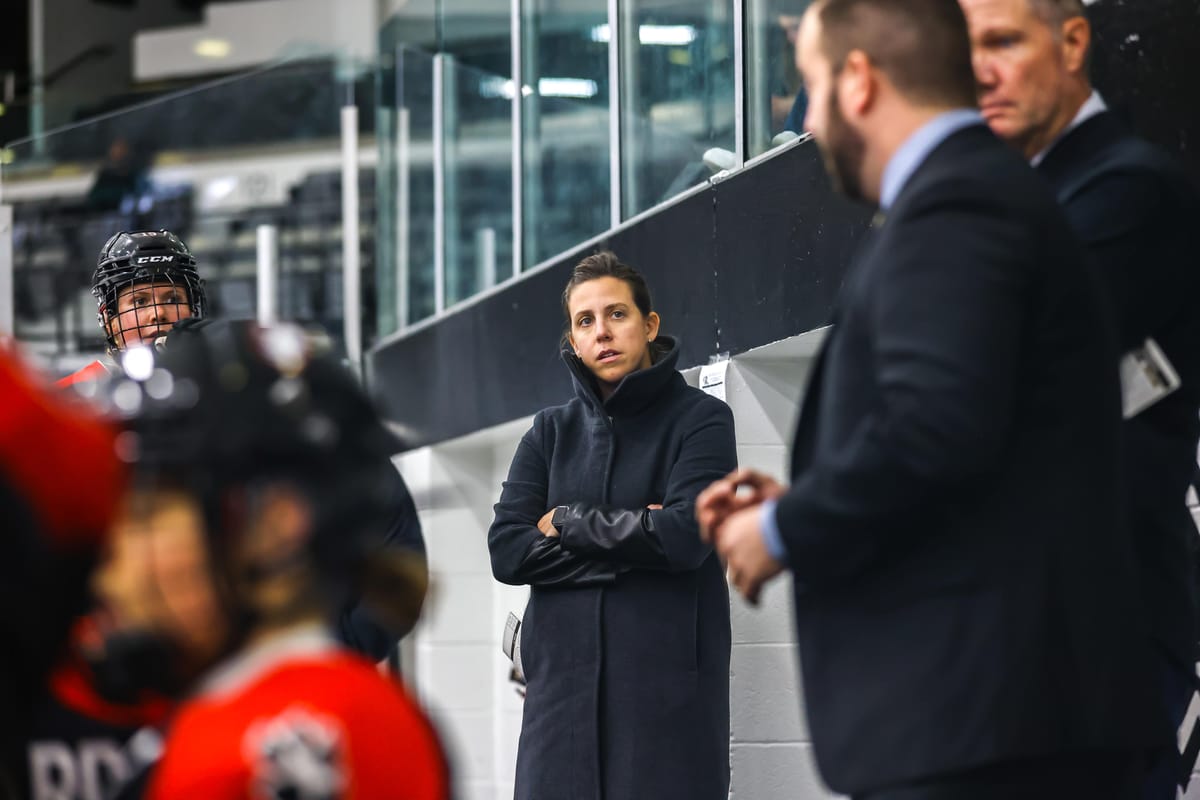
Northeastern assistant coach, and alumni of the women’s hockey program, Lindsay Berman has been around the sport at all levels for years. Following her graduation from NU in the Spring of 2010, she spent four years in the CWHL with the Boston Blades, and one season in the NWHL/PHF with the Connecticut Whale.
Since her professional career ended, Berman has moved into the coaching side of her career. She was an assistant and head coach of the UMass Boston Beacons program (Division III) for six years, spent a year as an assistant for Brown University (DI) in 2014-15, and spent a year in the same role for the Boston Pride (NWHL/PHF). Berman returned to her alma mater in the summer of 2018, where she has been in the assistant coach role for the most recent run of success for the Huskies’ program.
A month into the season, I caught up with coach Berman to discuss all sorts of things – from her playing career, to her time now as a coach, and even some of her favorite memories from her time at Northeastern in all capacities.
Answers have been lightly edited for clarity purposes. Please note this interview was conducted in October.
Emma Sullivan: Could you talk me through your process of becoming a coach? Did you always know this was something that you wanted to do after you finished your career as a player, or was this something that popped up after you finished?
Lindsay Berman: It popped up. I knew that…. Well, I played for a long time after college, so I knew I wanted to be a part of the game in some way. And then, like right after graduation, a good friend of mine became a head coach and asked if I wanted to coach with her, and I thought it’d be a great way to learn and get my foot in the door.
And then oddly enough, I didn’t end up coaching with her that year – that’s when I got my first job at UMass Boston. And I had no idea what I was doing, but I knew that I loved it and I loved it right away.
So I think I got pretty lucky with who I was coaching with and where I was coaching and somehow it ended up being exactly where I should have been.
ES: You mentioned UMass Boston – you spent four years at Northeastern as a player, then you went and were an assistant at UMass Boston and then head coach as well. What was it like deciding to come back to Northeastern to coach at your alma mater after being a head coach for another program?
LB: It was a really exciting opportunity when I got the call from coach [Dave] Flint that summer. I loved UMass Boston so much and I was learning and I felt like I was still being challenged on a daily basis and I felt like on the recruiting front that we were getting the student athletes that we were going after and it was becoming like what we had envisioned.
And then when [Flint] called I was super flattered obviously, and excited for the opportunity. But I thought long and hard about it, and called my network of people for advice. At the end of the day, it was like – you can’t pass up this opportunity because these things don’t open up all the time. And again, once that phone call, like once I accepted it, I didn’t look back and it’s been all positive from there.
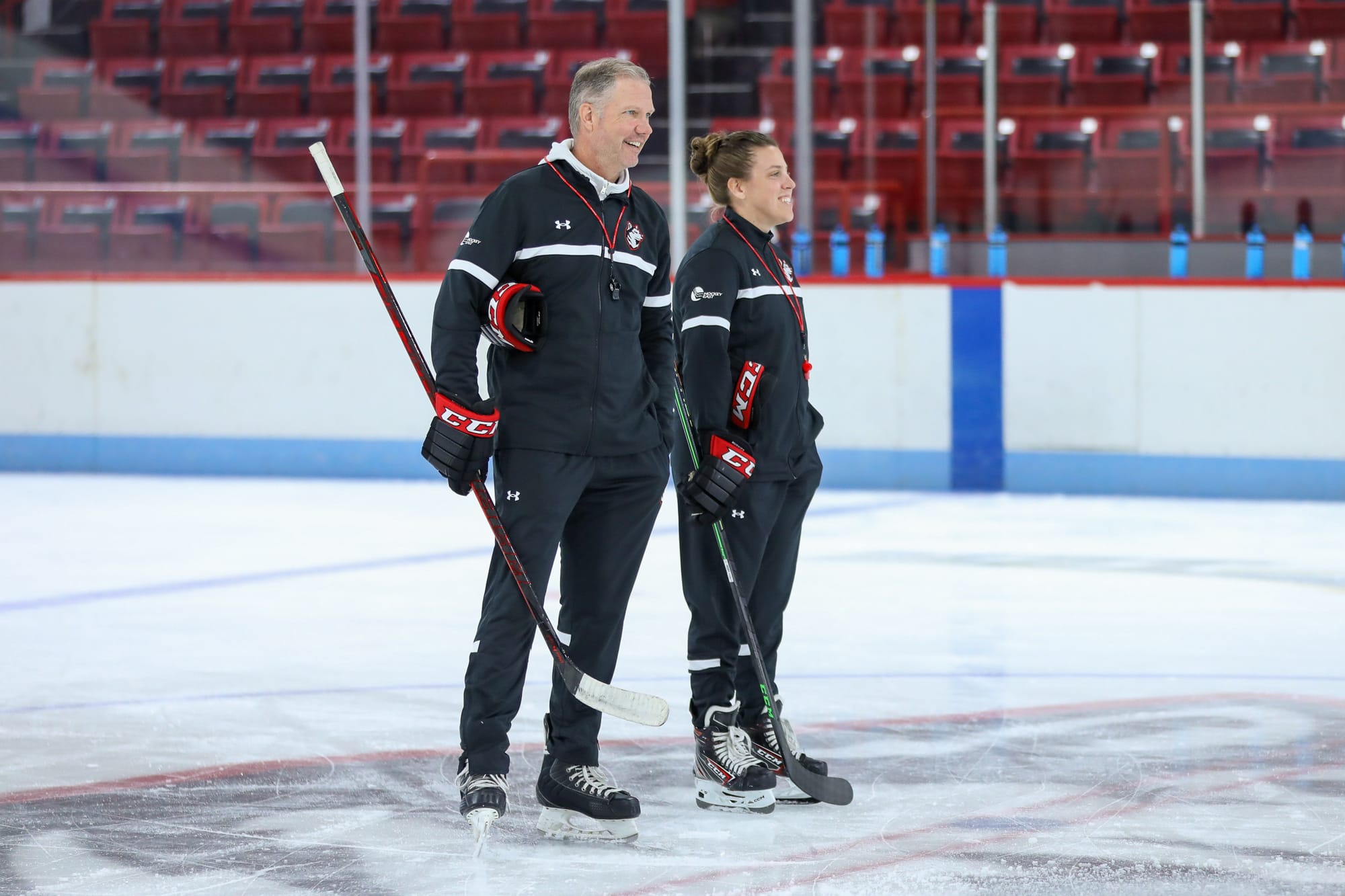
ES: What do you think is the most rewarding part of being a coach at either the NCAA level or just overall?
LB: There are a couple of things. One is getting to be a part of this portion of their lives where they’re growing and learning and becoming who they are and having a small hand in that.
The other part is watching them improve and grow and it’s so crazy to think about some of our players… like when they step foot on campus, even for a visit, and then they get here in the fall and then to watch them, you know, grow through their time here – it’s just so cool to see that.
After the fact, the friendships that you have from the time that they were here and then seeing them get married and get jobs, and being a part of their lives even after college, it’s super rewarding.
ES: Going into your professional career, what was that experience like and how do you think that helps you now as a coach for players that are looking to play in the PWHL or even just to play at the NCAA level?
LB: I have such fond moments of playing after college. I had a great college experience too, but my first year playing in the CWHL for the Boston Blades, it couldn’t have come at a better time. That was the first year of the Boston team in that league, so there was this random group of recently graduated players that ended up together.
And to think about some of the names I got to play with that year – I have so many memories of that year alone. Then three more years of that program and then joining the NWHL/PHF as a player and a coach. I learned a lot from the players I was playing with, the coaches that I played for, and then being able to transfer that to wherever I was at the time.
My first three years at UMass Boston I was playing for the Blades, and I just remember coming to the rink at UMass Boston with a new drill or a new way of teaching something, and our players at UMass Boston were coming to our CWHL games and the crossover there was awesome. It really helped give me a new perspective, like pretty regularly. All the time I was thinking about things in a different light because I was getting so many different opinions and looks at things.
To be able to play seven years I think it was after college was pretty cool, and I don’t think I realized it at the time. But now looking back, I’m glad I was able to do that.
ES: What was it like balancing all of that – being a coach, playing in the CWHL or the NWHL/PHF? There are a bunch of players now that are working alongside some schools in Massachusetts – Taylor Girard at Assumption, Aerin Frankel at Stonehill – what would be something that you recommend to them just as a tidbit on how to balance everything?
LB: I think it’s kind of what we’ve always known as athletes. It’s just what you do and I don’t think you think a lot about it. You just… you have practice, you go and you give it your all and then you have to get to another rink really quickly and you just do it.
I guess I would just tell them to enjoy it. Like this is... this is not a job, getting to coach and play. Even though they both are jobs, they’re not. It’s really fun, and it’s also fun to be busy, and I think both of them would say they’d be bored if they weren’t bouncing from rink to rink.
But it was definitely challenging at times, because you’re also trying to make ends meet at the same time. So you kind of have to take on quite a bit, but it was more than anything else. I didn’t really think about it as – again – as work. It was just exactly where I wanted to be at the time.
ES: From that, how does it feel to see the growth of the PWHL especially in the last year now with so many names that you’ve coached through your time here now playing at the top level?
LB: It’s so cool. Even when I started playing in the CWHL, I thought about all the players that had come before us to make that available, and a lot of them were still in the league. You know, playing against like Jayna Hefford, Gillian Apps... I couldn’t even believe they were on the same ice.
But those women paved the way then, and I don’t think we are where we are today without that. So to have been a small part of it, I guess in some way is pretty cool.
We were at the Boston PWHL game last year, I think it was their last home game, and seeing their circle in the middle of the ice after the game – I was definitely moved to tears because… I don’t know. I just quickly thought about how far we had come and to see [Aerin] Frankel and Alina [Müller] on the ice. They appreciate it so much; they don’t go to the rink and think ‘oh we deserve this.’
They do deserve it, but they go to the rink with gratitude and they also can’t believe this is what they’re doing every day. So it has been so cool to see the growth and to see how many names have come through, and how many people have really made this possible.
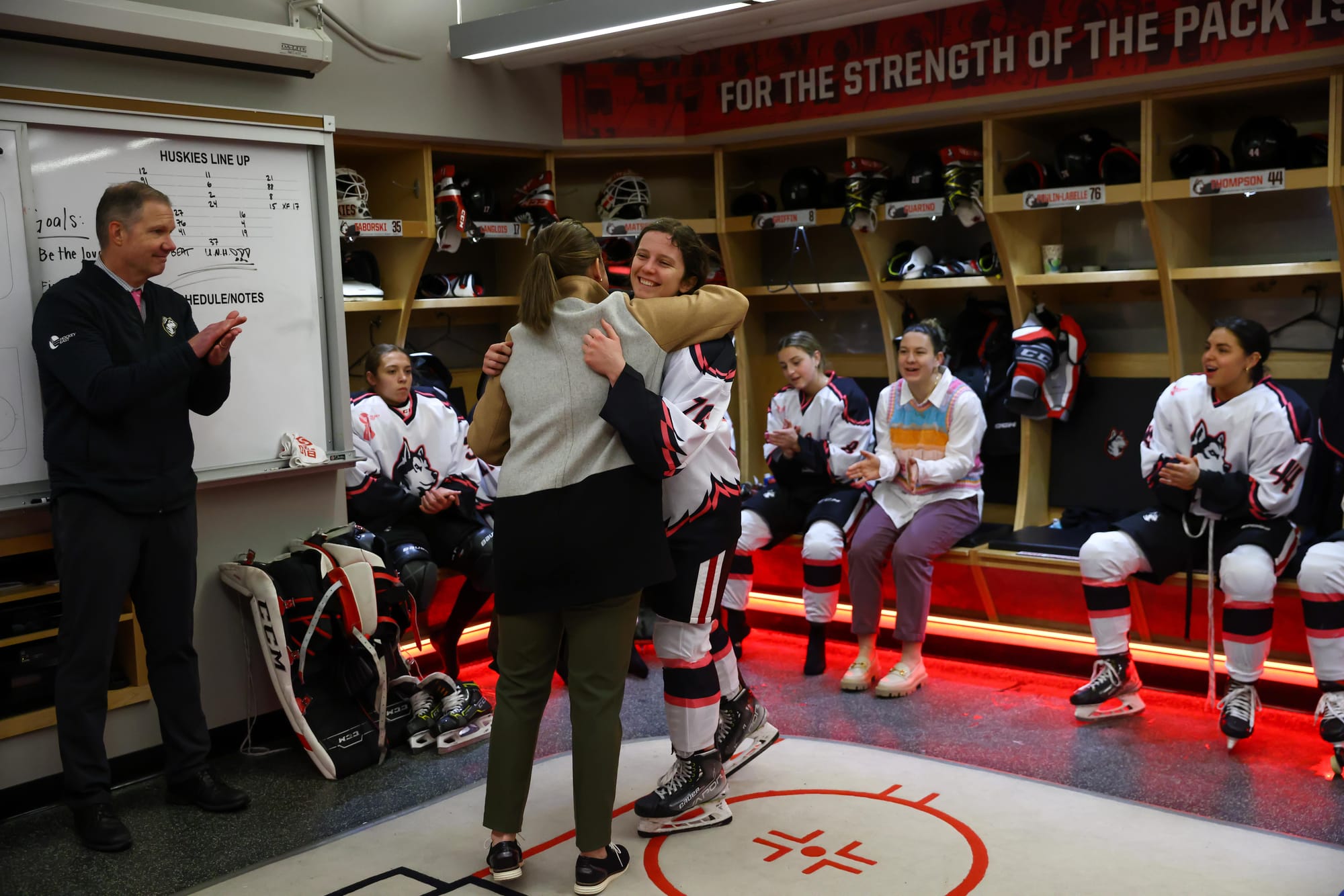
ES: Switching gears just a little bit, you’re only a couple of games into the season this year, but what are you looking for and what are your expectations from the team overall in 2024-25?
LB: It’s been really fun. It’s fun every year, just having a new group. But I love the grit that this group brings. We play so hard, and if anybody came to practice, they would not be surprised by what they see because they practice exactly how they play and it’s a fun challenge.
We’ve split every weekend so far, so we’re trying to figure out how to bring it on Day Two. But we met as a staff the other day and we were talking about like – this is good. This is good to try to figure out, it’s good to face adversity early here and hopefully come winter time we have it figured out.
I see us making a push in the end. That’s always the expectation here, but I think we have the personnel to do it and we certainly have the leadership to do it. Our leadership group has been unbelievable so far. So it’s been a really fun group to be around.
ES: Do you have a favorite moment of your time either as a coach or as a player at Northeastern?
LB: As a player, my favorite memory was Frozen Fenway. It was my senior year. I will never forget literally every detail of that day. And I think the Beanpot from this last year at the [TD] Garden may have jumped it as a coach.
ES: Can you talk a little bit about being on the bench and getting to see the players out there, especially after you guys won?
LB: Obviously winning, you know, we’re going to remember that forever. But I think every team that played at the Garden that night is proud of the history that they were a part of and will remember that forever – players and coaches.
I remember being underneath during warm ups, and we don’t watch warm ups. So we were just in the room, and you can’t really hear anything underneath the Garden, and I had never coached there before so I didn’t know.
And then we walked out for starting lineups and I stood on the bench and I couldn’t believe how many people were there – I have the chills actually talking about it. We didn’t know there were 10,000 people there, and they were there. I remember my feet were shaking on the bench because of how loud the place was. I was like ‘Wow, what an experience for our players.’
And then my next thought after our first shift was ‘Wow, none of them are even nervous. They’re just playing.’
So to be a part of that, and for our players to have that memory forever, and then to win it in overtime – you really couldn’t have written it any better.
ES: Are you looking forward to the next Beanpot in January?
LB: I am. I think it’ll be cool to see that we can do it again.
Not Northeastern winning, but I mean as a sport getting that many people in the building, because I think people are excited about it now. We set the standard in year one, and we’re just gonna keep doing it, year after year.



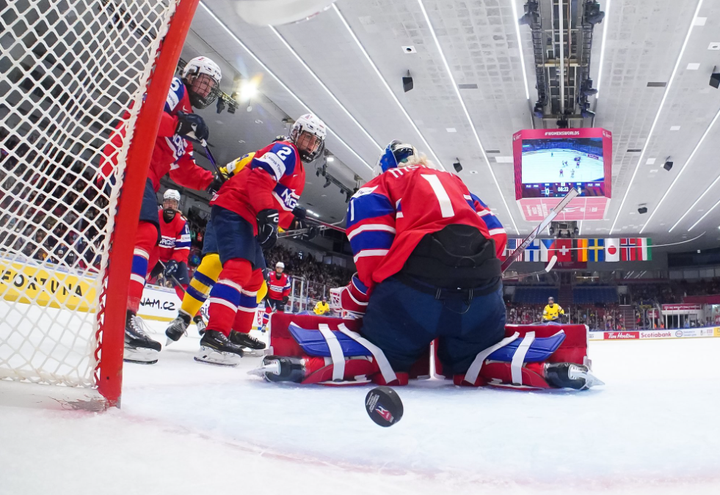
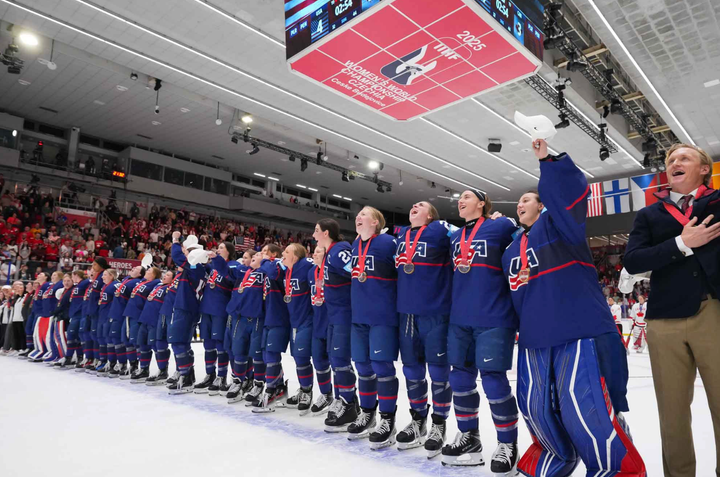
Comments ()